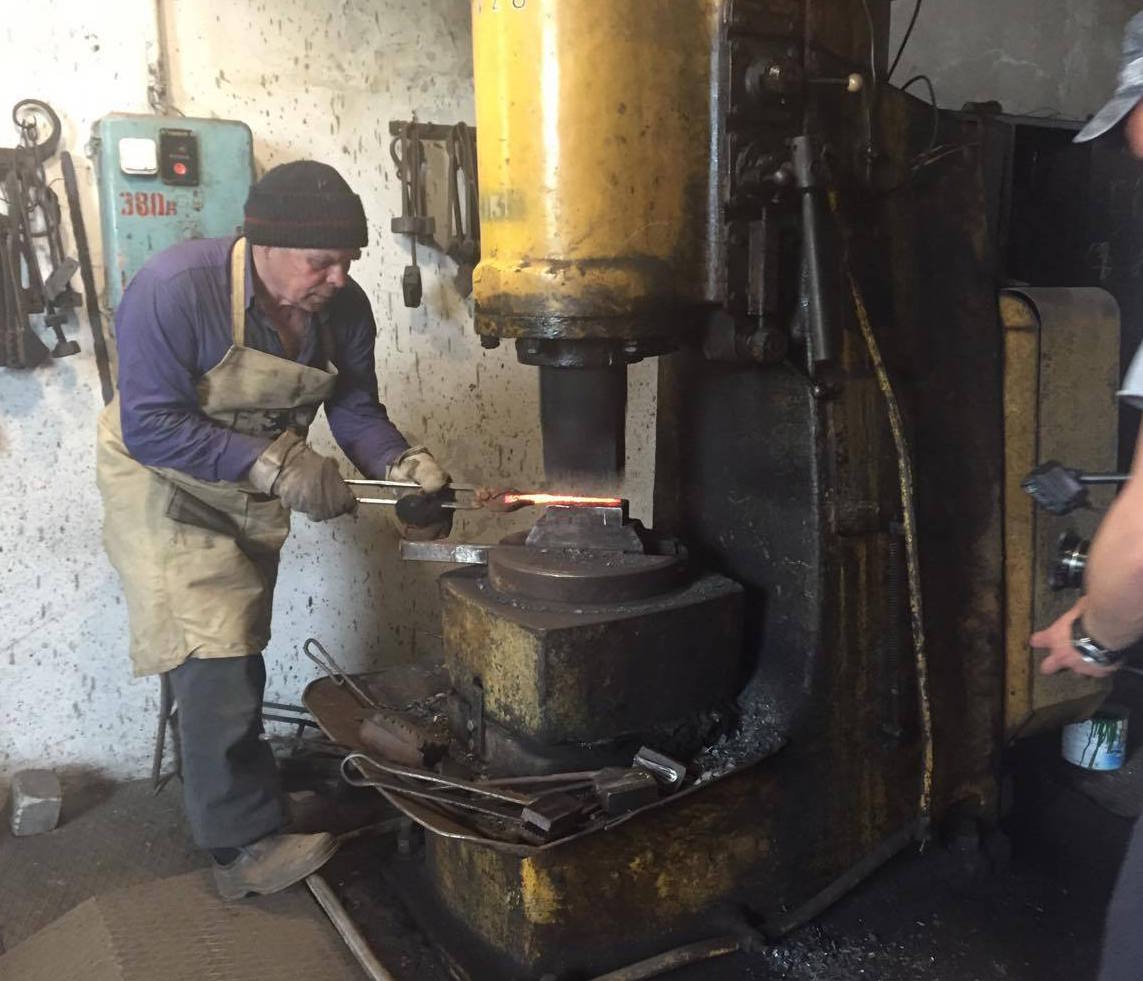“He wasn’t in agony because his right hand had been severed; he very calmly asked, “Will I live to see my Sofia?” When I asked him, “Who is Sophia?” he answered, “My little daughter. She is two years old.”
Oleksandr Danyliuk, 128th Independent Mountain Infantry Brigade, Zakarpatia Oblast
"I am a doctor and an emergency room surgeon. Why did I become a doctor? It has been my dream since childhood: medicine, and surgery in particular. And not just surgery, but specifically emergency room surgery. As a boy I used to watch the Discovery Channel, and a program called “Emergency.” It followed emergency room surgeries, and how patients with very serious traumas and internal bleeding were brought to these teams. I observed them at work, their flurry of motion while operating, and how quickly they executed their tasks. They would stop the blood loss, and they would save lives. This show had such an impact on me that because of it I decided to become a doctor. Until then I had my sights on becoming a veterinarian, and remember confusing the word veterinarian with veteran. It so happened that I have become a war veteran, so one must be careful what one wishes for as a child,” he says smiling. “I never dreamed I’d become a veteran. I did want to be a veterinarian and already had patients like rabbits, worms, and frogs. When it dawned on me that I could save human lives as a surgeon, I liked that idea very much. From then on I couldn’t see myself in any other profession. I graduated from university in 2011 and became a doctor. I completed a three year surgical internship and received my license to practice medicine. In my first job I worked for two months on my own, the next job for three and a half years, and six and a half years now in total. I may only have a limited number of years of experience, but I am only 27 years old.”His story, repeated so often in the lives of many others, began at the Maidan.
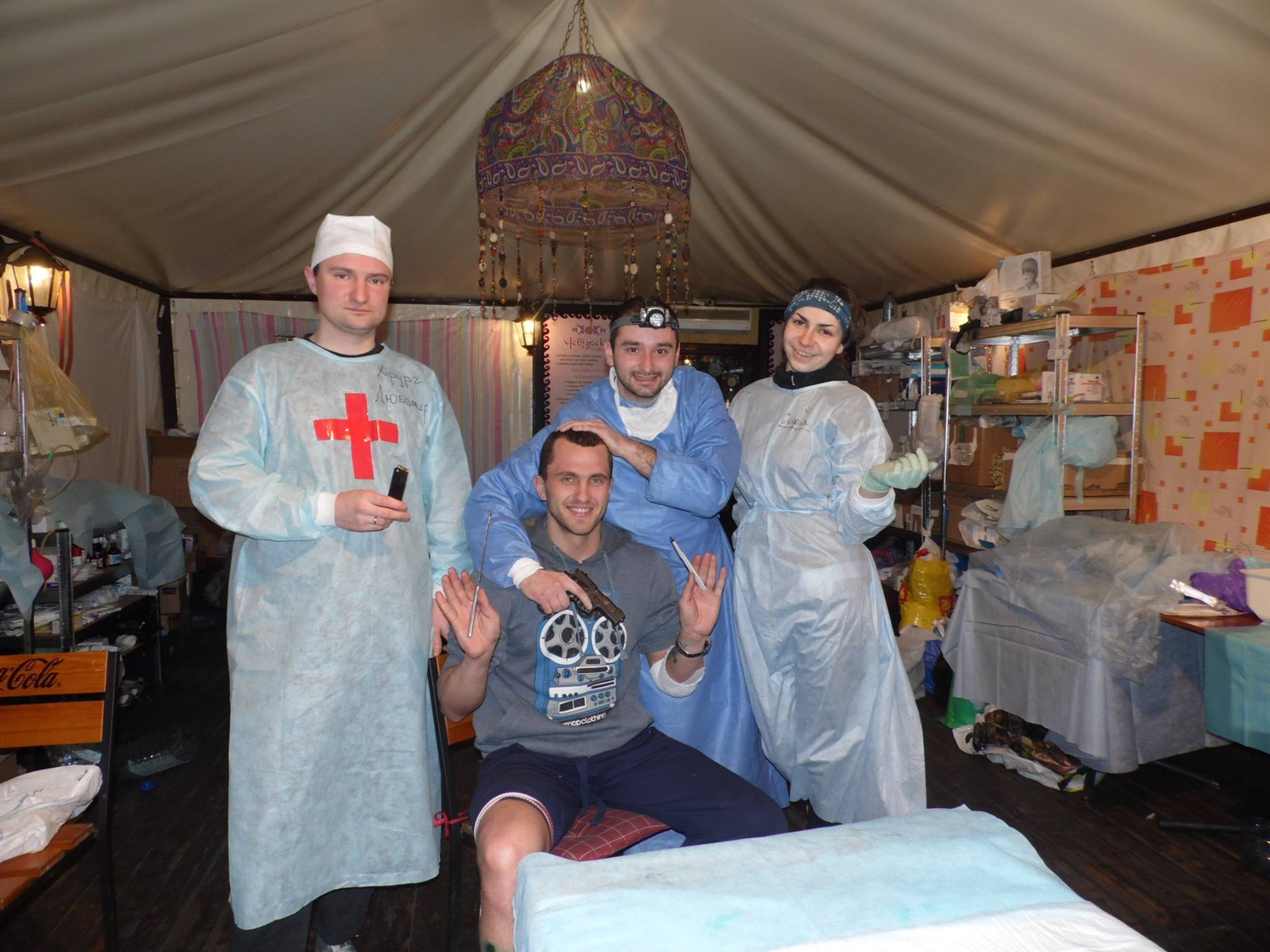
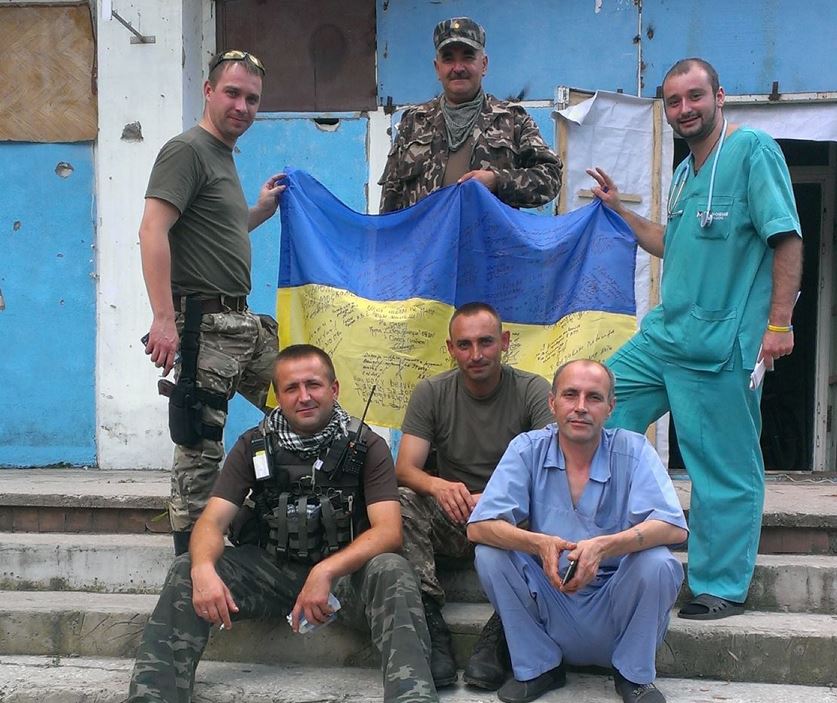
The medical team we had to work with consisted of 3 anesthesiologists, 1 doctor narcotics specialist, medical brigade personnel, an administrative supervisor, one medical assistant, and me, the surgeon. We also had technical personnel of a driver, electrician, and cooks.”Over the course of those nine days when it was impossible to evacuate the wounded, we had 95 registered patients and around 10 more who were not documents. Some days we would receive five new patients, while up to 20 would be brought to us on another day.
Sashko is describing the events of February, 2015. This was the Debaltseve cauldron, which did not officially happen, according to high ranking officials. Such denials are not uncommon during wartime… The blockade of Debaltseve lasted 9 days. During that time, the medical company established a functioning hospital down in the soldiers’ protective encampment. Under the leadership of a surgeon from Zakarpatia, this small team saved nearly a hundred lives of our Ukrainian defenders.
The reinforced shelter where they established their hospital was originally intended as sleeping and eating quarters. It was never constructed for the purpose of a hospital or medical operations, especially not at the sophisticated level of exposed internal organs. Sasha explains:
“Not in my wildest dreams could I ever have predicted that I would raise a scalpel under those conditions, on foam mattresses, in that clay, in that earth… That was the first time in my life I worked with a scalpel under such circumstances. But I realized that we weren’t going anywhere, more and more wounded were arriving, and we needed to do something with them. Infections would only worsen. If the wounds were visible, we could stop the loss of blood. But then what about the internal wounds, lacerations, burns? Surgical intervention was required. I began to realize that I had only one course of action...” So he began a rescue marathon.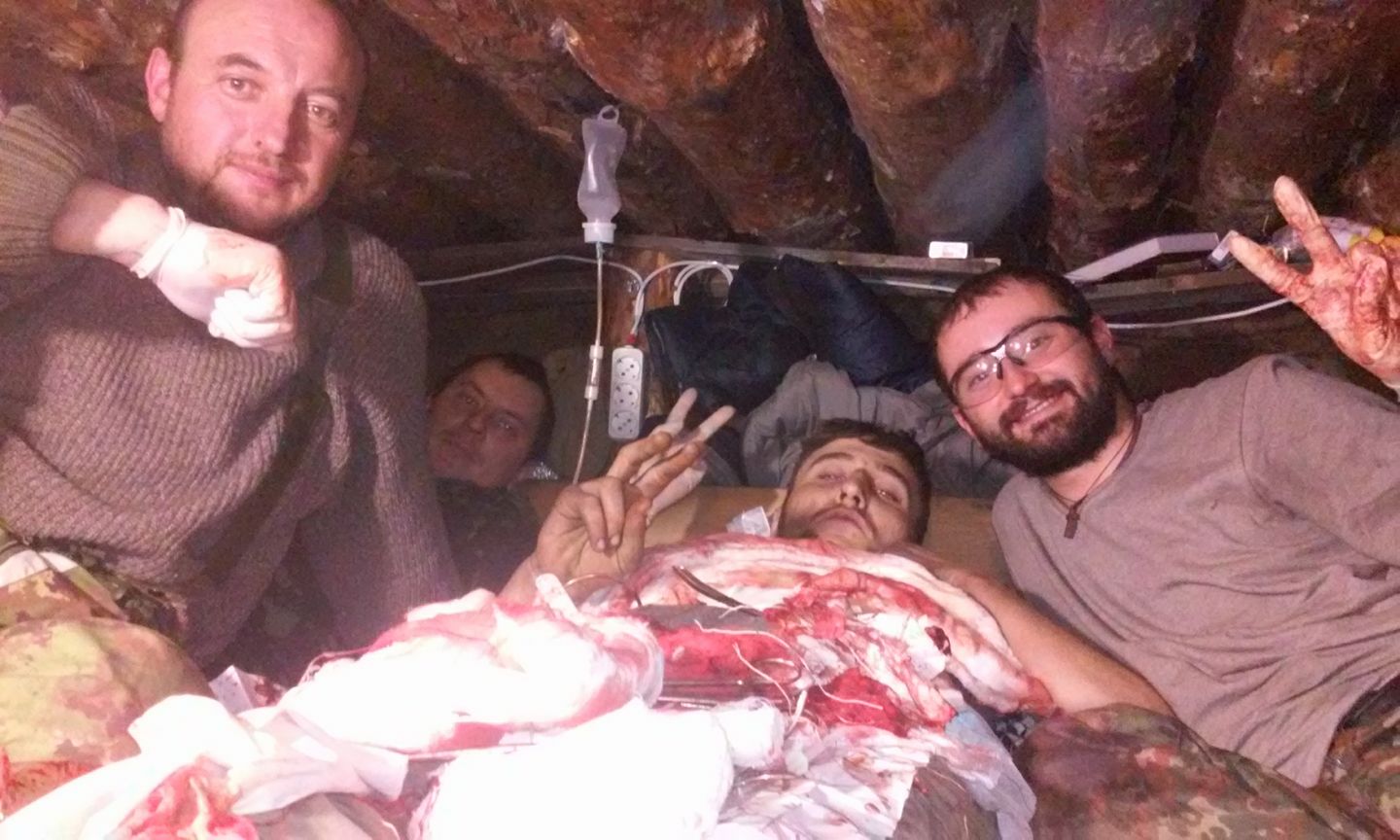
How many were helped but then didn’t survive later is unknown to me. If we operated on them, they were alive when they left us. But then… Evacuation attempts were made every day; they would try break through the blockade. These convoys would be shot at and about 20 of my patients died that way. I didn’t know all of them personally , and some I have forgotten, but some I remember very well, because they were my brothers in arms, my friends, and they didn’t survive. These were people who were in my life for a few hours, or for a day, and they were killed, deliberately fired upon during the evacuation attempts,” continues Sasha quietly. “I remember Oleh Naumenko, a policeman from Chernihiv Oblast. There was Vitaliy Lototskiy from Ternopil, who was with the 128th brigade. And Denys Chabanchuk from Volyn. They stand out in my mind because of their heroism and courageous fight throughout their medical ordeal. Oleh, for example, was in very bad shape, and in our triage, he wasn’t deemed for first assistance. He had to wait. We started with those we were most likely to save. When you only have one surgeon, whose hands are occupied with one patient, you can’t reach over to help someone else. When I was finished the surgery I was doing, I walked over to him. He was just regaining consciousness.I never left my post for a day and a half. For me, it was constantly patient after patient, non-stop with the wounded, one after the other. It still bothers me that we could not help everyone; some did not live long enough for treatment…
“We fought for his life and we stabilized him to such an extent that he even began to smile. Among my patients at that time he was in the most serious condition. He had such a strength and heroism about him. Not once did he complain or ask for more pain medication or anything else… That first night he was already able to drink water, and by the next morning he had a bit of solid food. We all began to hope for his survival. However, when they tried to evacuate him, they were targeted and came under enemy fire.His first words were, “Will I ever see my Sofika again?” I asked him, “Who’s she?” and his reply was, “My daughter. She is two years old.” He could have been screaming that his hand had been mangled, his tailbone broken, and there was a large piece of shrapnel in his chest. He wasn’t screaming, he wasn’t complaining, but simply was asking about his wife and child. I didn’t know what to tell him. That was very agonizing… And it turned out we kept him alive.

Each of these memories is very painful for Oleksandr. Those of us listening to him simply did not know what to say in response, when Sasha was in that shelter and had no answer to Oleh Naumenko’s question about his daughter… We really are fighting an accursed war!
“When it was our turn to make a break for Bakhmut, that was on the evening of February 18, in a moment of clarity I finally understood that we had lost Vadym and Denys Chababchuk and all those I had gotten to know. It was a horrific realization,” said Sasha, painstakingly gathering his thoughts. “So many days, so many corpses… And I’m just referring to the ones I knew well. I came to the realization that if I don’t write all this down soon, I will forget, because my mind needs a coping mechanism to handle all that has happened. In the evening I would take time and write notes in a diary. I wrote lots, but never with any intention of writing a book. My goal was to remember what had happened for the sake of future generations, that they might learn about all of the things we experienced. We were granted a leave in March. My friends and I went to the mountains, my favorite form of rehabilitation. When I began to relate to them all that had happened, the wife of one of my friends kept insisting that I write a book. “This needs to be published,” she said. She continued like that all day, and by evening, I finally agreed. “Yes, I will do it.” I began to write, focusing on the themes I knew were important. I returned to the front, and continued with my writing when time allowed. I wrote that first draft in 10 months, printed what I had, and sent it to my brothers in arms who were also a part of those events, and who could add to or correct what I wrote, or remind me of incidents I had forgotten. “One journal asked permission to print a segment of the book, which I gave them. As a result, other former patients found me, and also the families of those who were killed. I was reminded of even more information thanks to them. I realized the book is nowhere near completion. I couldn’t believe I had forgotten those important details,” says a bewildered Sasha, who then finds his own answer: “I had suppressed them because of how fundamentally painful they were… As for the book, it is not very long, 80 pages on A4, or at least that is the shape it is taking. It is time to work on its publication, and even though I don’t have the time, I know it needs to be done. “I am no hero. It’s just how everything happened, and I was in the exact place and those events. I responded in the only way I could,” says Sasha, giving his perspective."The real heroes are the ones that I operated on. They held the front lines with their very bodies, as others continue even now to hold the front. I never fired a shot. They are my heroes, and I am just a prisoner of circumstance. I found myself in such a place and such a time, and not only that, I had an entire medical team that was always helping me. Thank God we endured to the end, even though it still bothers me that we did not save everyone… but I mean it when I say that I thank God I was there and that I made the decisions I made, and acted the way I did. Anyone else in my place would have done the same, or even better.
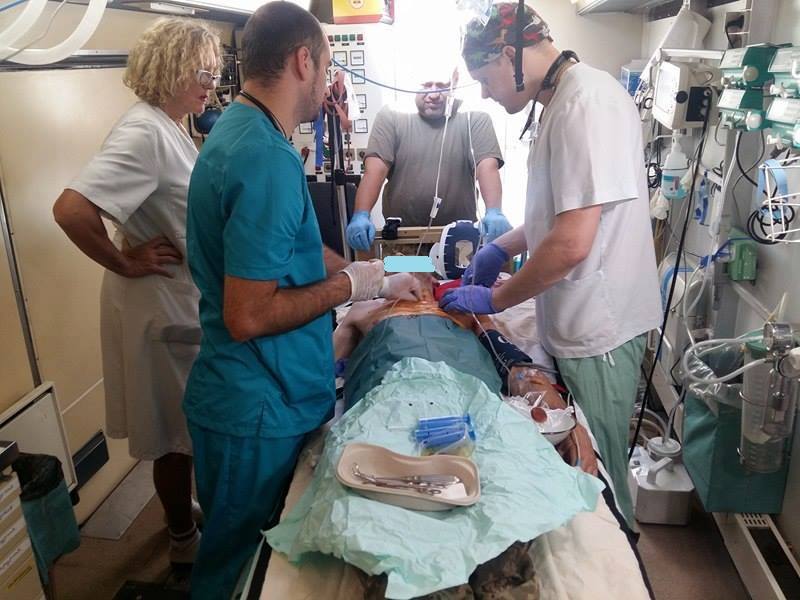
And how could they know who was operating on them? They would go on to have a further 25 operations in various hospitals. It’s hard to remember the emergency room doctor, that is when the patient is at his worst, in the most critical moments. After some later surgeries, and they feel better, they might start to remember who saved their life. I was at the very tip of their recovery, and so most do not remember me. But occasionally,” and with this Sasha smiles, “it is possible to meet up again, like with the these three former patients!” “My circle of acquaintances are divided into two groups, two worlds, those before and those because of the war. The Maidan and the war mark a definitive break with the past. Those I once considered to be my childhood friends, some of them are now like strangers to me, while with others, our friendship has strengthened tenfold. The Maidan and the war have brought new and real friends into my life. They have been with me from the first hours of the Maidan, and we continue to share a unity of spirit in our friendship. Sometimes things are difficult, really, really, really hard. There are times of disillusionment. But I try not to make myself out to be more than I am, so that later on people won’t be disappointed in me. But I will never throw my hands up in surrender, that would be a disgrace to the graves of those who gave their lives, and to those who now are risking their lives for our country. I receive so much encouragement from my group of friends; they encourage me, and keep me from any temptation to give up. When I am tired from work, (which currently is at the Ministry of Health Protection for the next month), and when something annoys me, it’s then that the phone rings, and I hear, “Sash, we’re here. We’re still going, right?” We get together and just go places, go for walks, excursions… They are the kind of friends that we don’t even need to say much about anything when we are together. We understand one another perfectly in our silence. If we have any problems, any questions, everything gets resolved almost intuitively. We were at the very sharp end of the war, and our problem-solving skills work just as well in civilian life. “But I do feel the pull of the front… my forte is with tactics, though not with strategy. I have seen the results of my work. There is no greater motivation to action than these people, and the results we can make. The results are solid, these Heroes constantly renewing my spirit whenever I spend time with them; and they give me that feeling of being needed. Some of my friends have experienced the Maidan but not the war. They are very active as civilian volunteers, assisting the army with tactical medicine supplies, for example. They have found their niche, something they can contribute, since not everyone can bear arms, and now they are a hundred times more effective helping from behind the lines. But they also feel called to the front, since they have been there already in non-combat roles."“It makes me very happy when I find people, or they find me, those whose lives have crossed paths with mine at the front. Volunteers play a big role in bringing us together. “Who operated on you over there?” they’d ask. “He had a beard.” “Was his name Sasha?” “I wouldn’t know.”
“My plans for the future?” Sashko asks of himself. “That I invest all my resources, experience, and abilities into our victory, that’s the main thing. We need to end this war, and with our victory, with the renewal of our territorial integrity and sovereignty. That’s first. Second, to keep bringing our medical system to a higher and higher standard, so that the patient receives high quality care, and the medical personnel receive a decent salary. Finally, it is high time that I began to give some attention to my own personal life, something I have been unable to do so long as there is this war in our country.”"It is a syndrome, the desire to go back there. We all feel it: the authentic friendships, that’s what unites us. The men and women over there.”
More stories from "If not for the war":
- “I came to love Ukraine.” How Levan from Georgia trains soldiers of the Right Sector
- “If not for the war”: 12 photo reports about maternal love and heroism
- What I would do if it weren’t for the war





